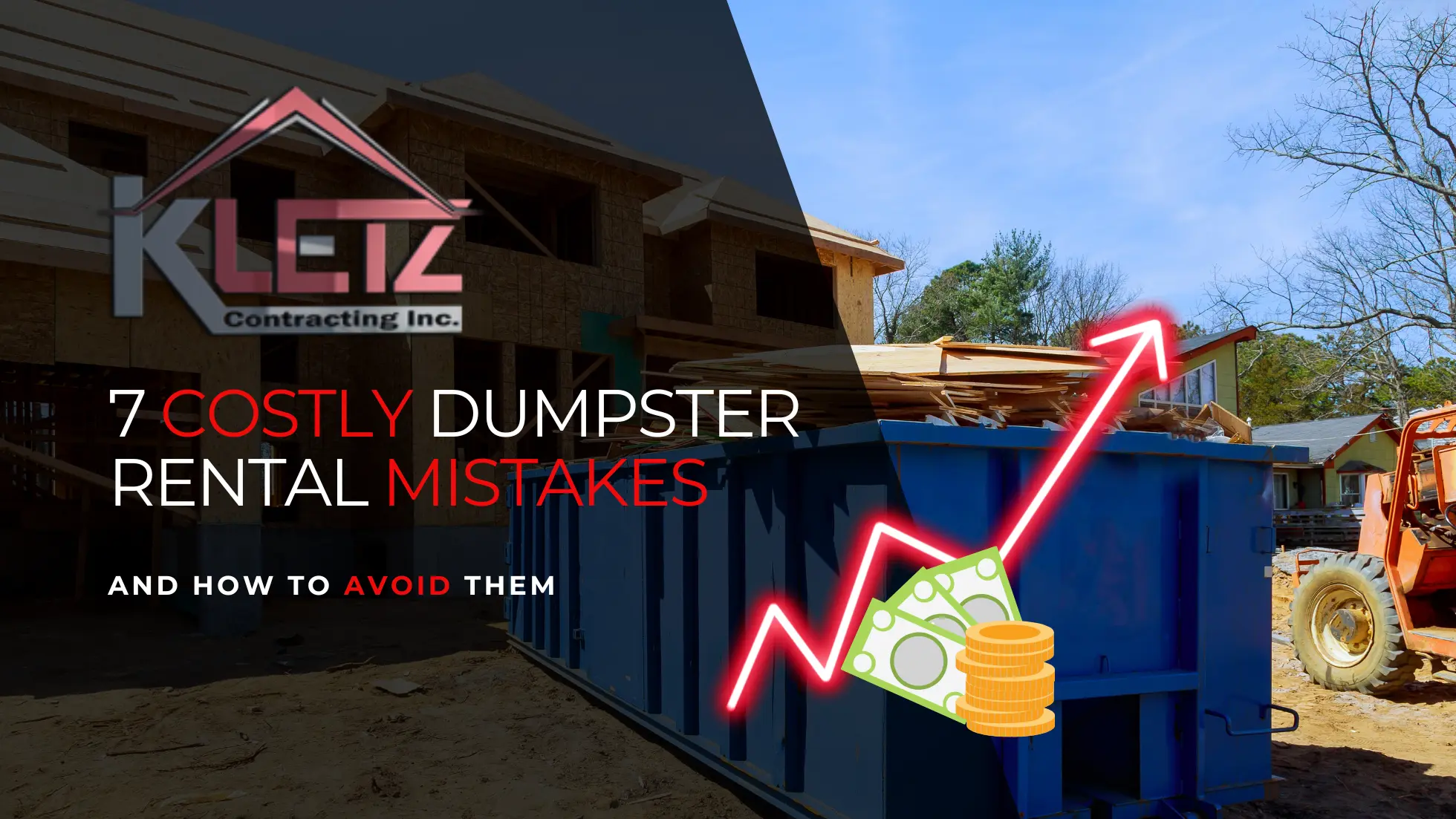7 Costly Dumpster Rental Mistakes and How to Avoid Them
In nearly three decades of providing dumpster rentals across Pittsburgh, we've seen every mistake imaginable—and helped customers recover from most of them. The difference between a smooth, budget-friendly rental and an expensive nightmare often comes down to avoiding a few critical errors. This guide reveals the most costly mistakes homeowners make and provides expert strategies to sidestep them entirely.
Mistake #1: Choosing the Wrong Size (The $400+ Error)
The Problem:
Going too small seems economical until you're paying for a second dumpster or overflow fees. Going too large wastes money on unused space. Both mistakes are surprisingly common.
The Hidden Costs:
- Second dumpster rental: $350-500
- Overflow fees: $75-150
- Labor delays: Priceless frustration
How to Avoid It:
Use this realistic estimation guide:
- Bathroom remodel: 12-yard minimum
- Kitchen renovation: 12-15 yards
- Basement cleanout: 12-15 yards
- Single room update: 12 yards
- Multi-room project: 15+ yards
Pro tip: When contractors estimate "3-4 pickup loads," multiply by 1.5. Debris always expands once demolished.
Mistake #2: Contaminating Your Load (The $500-2,000 Penalty)
The Problem:
One prohibited item can contaminate an entire load, triggering hefty disposal fees and potential legal issues.
Expensive Contamination Examples:
- Paint cans mixed in: $500+ hazmat fee
- Old electronics: $200+ e-waste penalty
- Asbestos tiles discovered: $2,000+ specialized disposal
- Chemicals or oils: $750+ environmental fee
Prevention Strategy:
Create a separate staging area for:
- Paints, stains, solvents
- Batteries and electronics
- Chemicals and cleaners
- Questionable materials
Before loading anything questionable, call and ask. Five minutes prevents hundreds in fees.
Mistake #3: Ignoring Weight Limits (The Sneaky Overcharge)
The Problem:
Residential dumpsters have weight limits. Exceed them, and per-ton overage fees add up fast.
Heavy Materials That Catch People Off Guard:
- Concrete: 150 lbs per cubic foot
- Dirt/soil: 100-120 lbs per cubic foot
- Roofing shingles: 2-4 tons per roof
- Plaster: Significantly heavier than drywall
- Wet materials: Double the weight
Costly Example:
Cranberry Township homeowner loaded broken concrete patio into 15-yard dumpster. Overage weight: 3 tons. Extra cost: $450.
Smart Solutions:
- Separate heavy materials
- Rent specific concrete dumpsters
- Mix heavy items throughout load
- Discuss heavy materials upfront
- Consider multiple smaller loads
Industry insight: Honest companies discuss weight limits upfront. If they don't mention it, ask.
Mistake #4: Poor Placement Planning (The $300-3,000 Oops)
The Problem:
Wrong placement leads to property damage, permit violations, or inaccessible dumpsters.
Expensive Placement Mistakes:
- Cracked driveway: $500-3,000 repair
- Dead grass: $300-800 restoration
- Blocked emergency access: $250 fine
- Street placement without permit: $75-200 fine
- Utility line damage: $500-5,000 repair
Proper Placement Protocol:
- Measure delivery path (10' wide, 15' high clearance)
- Choose stable, level ground
- Use plywood protection on driveways
- Check HOA rules
- Verify permit requirements
- Mark utilities and sprinklers
- Consider seasonal conditions
Mistake #5: Procrastinating on Reservations (The Schedule Killer)
The Problem:
Waiting until the last minute during busy season means no availability, rushed decisions, or premium pricing.
Peak Demand Periods:
- Spring cleaning: April-May
- Summer renovations: June-August
- Fall projects: September-October
- Storm cleanup: Unpredictable
The Domino Effect:
- No availability = project delay
- Project delay = contractor penalties
- Rush delivery = premium fees
- Wrong size available = compromise choice
Booking Best Practices:
- Reserve 1-2 weeks ahead
- Confirm delivery date with contractors
- Book early for weekend delivery
- Have backup dates ready
- Consider weather contingencies
Mistake #6: Illegal Dumping Attempts (The $1,000-25,000 Disaster)
The Problem:
Allowing others to use your dumpster or dumping in others' containers brings serious consequences.
Legal Ramifications:
- Illegal dumping fines: $300-1,000 first offense
- Repeat offenses: Up to $25,000
- Criminal charges possible
- Civil lawsuits from property owners
- Contamination liability
Common Scenarios:
- Neighbors "just adding a few things"
- Contractors dumping other job debris
- Passersby treating it as public disposal
- Subcontractors cutting corners
Protection Strategies:
- Cover dumpster when not in use
- Post "No Illegal Dumping" signs
- Monitor with security cameras
- Lock if extended non-use
- Report violations immediately
Mistake #7: Improper Loading Techniques (The Efficiency Killer)
The Problem:
Poor loading wastes space, creates hazards, and can damage the dumpster or your property.
Space-Wasting Loading Errors:
- Throwing items from height (creates voids)
- Not breaking down furniture
- Random placement vs. strategic loading
- Leaving air gaps
- Piling all heavy items in one spot
Safety and Damage Risks:
- Overloading one side: Tip hazard
- Items above rim: Road hazard, fines
- Protruding materials: Transport danger
- Uneven weight: Driveway damage
Professional Loading Strategy:
- Place flat items (drywall, plywood) first
- Break down all furniture and boxes
- Fill hollow items (bathtubs, sinks)
- Distribute weight evenly
- Keep heavy items low
- Work in layers
- Nothing above container rim
Efficiency gain: Proper loading increases capacity by 30-40%.
Bonus Mistakes to Avoid
Not Reading the Fine Print
- Understand all fees upfront
- Know rental period terms
- Clarify pickup procedures
- Verify acceptable materials
Assuming All Companies Are Equal
- Compare total costs, not base prices
- Check insurance coverage
- Verify local business presence
- Read actual customer reviews
Forgetting About Weather
- Rain doubles debris weight
- Snow blocks access
- Wind scatters materials
- Heat affects placement surface
Your Mistake-Free Rental Checklist
Before renting:
□ Accurately estimate project debris
□ Measure placement area and access
□ Check permit requirements
□ Reserve 1-2 weeks ahead
□ Discuss any heavy materials
□ Plan prohibited item disposal
During rental:
□ Protect placement surface
□ Load efficiently and safely
□ Monitor for illegal dumping
□ Keep prohibited items separate
□ Stay within weight limits
□ Nothing above container rim
The Professional Difference
Experienced rental companies help avoid these mistakes through:
- Honest size recommendations
- Clear communication about restrictions
- Proper placement guidance
- Transparent pricing
- Local regulation knowledge
- Responsive customer service
Make Your Next Rental Mistake-Free
Armed with this knowledge, your next dumpster rental should be smooth, predictable, and budget-friendly. At Kletz Contracting, our flat-rate pricing and expert guidance eliminate surprises. We've helped thousands of Pittsburgh homeowners complete projects without the common pitfalls.
Our commitment: No hidden fees, honest recommendations, and local expertise that keeps your project on track and on budget. Call (412) 200-2475 to discuss your project. We'll help you avoid every mistake in this guide and ensure your rental experience is refreshingly simple.
Because the only mistake worse than these seven is not calling experienced professionals who help you avoid them all.


